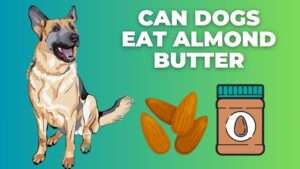Curious about sharing your favorite coconut butter treats with your furry companion? Before you dip into that jar, let’s unco
ver the scoop on whether coconut butter is safe for your four-legged friend.
While coconut products often boast health benefits, the question remains: can dogs indulge in this creamy delight without any ruff consequences?
Let’s dig our paws into the facts and find out!
Contents Overview
What is Coconut Butter
Coconut butter is a creamy spread made from pureed coconut meat. It’s rich in flavor and texture, with a naturally sweet taste.
Unlike coconut oil, which is extracted from the coconut flesh, coconut butter includes the whole meat, giving it a thicker consistency.
It’s versatile and can be used in cooking, baking, or simply spread on toast for a delicious treat.
Nutritional Value of Coconut Butter
Coconut butter is a nutritious addition to your diet, packed with essential nutrients. It’s a good source of healthy fats, including medium-chain triglycerides (MCTs), which can boost energy levels and support brain health.
Additionally, coconut butter contains fiber, which aids in digestion, and small amounts of protein and iron. While it is calorie-dense, moderation is key to enjoying its benefits without overdoing it.
Overall, coconut butter offers a tasty way to incorporate nutrient-rich ingredients into your meals and snacks.
Can Dogs Eat Coconut Butter Safely?
While coconut butter is generally safe for dogs to consume in small amounts, it’s essential to exercise caution.
Some dogs may experience gastrointestinal upset, such as diarrhea or vomiting if they consume too much coconut butter due to its high fat content.
Additionally, coconut products, including coconut butter, contain medium-chain triglycerides (MCTs), which can be beneficial for dogs in moderation.
However, excessive consumption may lead to pancreatitis, especially in dogs with underlying health conditions or sensitivities.
Before offering coconut butter to your furry friend, consult with your veterinarian to ensure it’s suitable for your dog’s individual needs and dietary requirements.
Potential Benefits of Coconut Butter to Dogs
1- Healthy Coat and Skin:
The fatty acids present in coconut butter may contribute to a shiny and healthy coat for dogs.
It could potentially alleviate dry skin and reduce itching, promoting overall skin health.
2- Improved Digestion:
The fiber content in coconut butter may support digestive health in dogs by promoting regular bowel movements.
Additionally, MCTs can be easily absorbed and metabolized, providing a readily available energy source for active dogs.
3- Boosted Immunity:
Coconut butter contains lauric acid, known for its antimicrobial properties.
This may help boost the immune system and protect against certain infections in dogs.
4- Weight Management:
The MCTs in coconut butter have been linked to increased metabolism and may aid in weight management for overweight dogs when used in moderation.
Potential Risks and Precautions of Feeding Coconut Butter to Dogs
While coconut butter offers potential benefits for dogs, it’s essential to consider the possible risks and precautions associated with feeding it to our furry friends.
Understanding these factors can help ensure the safety and well-being of our canine companions.
Let’s explore the potential risks and precautions of feeding coconut butter to dogs.
A- Potential Risks
High Caloric Content:
Coconut butter is calorie-dense and can contribute to weight gain if fed in excess, leading to obesity and related health issues in dogs.
Digestive Upset:
Introducing coconut butter too quickly or in large quantities may cause digestive upset in some dogs, resulting in symptoms like diarrhea or vomiting.
Allergic Reactions:
While rare, some dogs may be allergic to coconut or develop sensitivities to it over time, leading to allergic reactions such as itching, hives, or gastrointestinal issues.
Pancreatitis Risk:
Dogs with a history of pancreatitis or those prone to the condition should avoid high-fat foods like coconut butter, as it may exacerbate symptoms or trigger an episode.
B- Precautions
Moderation:
Feed coconut butter to dogs in moderation, taking into account their size, age, and activity level to prevent excessive calorie intake and weight gain.
Gradual Introduction:
Introduce coconut butter slowly into your dog’s diet, starting with small amounts and monitoring for any adverse reactions before increasing the serving size.
Monitor for Allergic Reactions:
Keep an eye out for any signs of allergic reactions or sensitivities after feeding coconut butter to your dog, such as itching, redness, swelling, or gastrointestinal issues.
Consultation with a Vet:
Before incorporating coconut butter into your dog’s diet, consult with your veterinarian, especially if your dog has any underlying health conditions or dietary restrictions.
Safe Ways to Feed Coconut Butter to Dogs
Coconut butter can be a tasty and nutritious addition to a dog’s diet when fed safely and in moderation.
By following safe feeding practices, pet owners can ensure that their canine companions enjoy the benefits of coconut butter without any adverse effects.
Let’s explore some safe ways to feed coconut butter to dogs.
Start Slowly:
- Introduce coconut butter to your dog’s diet gradually, starting with small amounts.
- Monitor your dog for any signs of digestive upset or allergic reactions before increasing the serving size.
Choose High-Quality Coconut Butter:
- Opt for organic, unprocessed coconut butter without added sugars or preservatives.
- Look for products specifically formulated for pets or those labeled as safe for canine consumption.
Use as a Tasty Topping:
- Spread a small amount of coconut butter over your dog’s regular food as a tasty and nutritious topping.
- Mix it into homemade dog treats or use it as a filling for interactive toys to provide mental stimulation.
DIY Frozen Treats:
- Mix coconut butter with other dog-friendly ingredients like mashed banana, plain yogurt, or pumpkin puree.
- Spoon the mixture into silicone molds or ice cube trays and freeze for a refreshing homemade treat.
Incorporate into Homemade Recipes:
- Use coconut butter as a healthy fat source in homemade dog biscuit recipes or baked treats.
- Combine it with other dog-safe ingredients like oats, peanut butter, and eggs for a nutritious and delicious snack.
Monitor Portion Sizes:
- Coconut butter is calorie-dense, so be mindful of portion sizes to prevent excessive calorie intake and weight gain.
- Adjust the amount of coconut butter based on your dog’s size, age, and activity level.
Consult with a Veterinarian:
- Before introducing coconut butter or any new food into your dog’s diet, consult with your veterinarian.
- They can provide personalized recommendations based on your dog’s individual needs and health status.
Be Aware of Allergies:
- Keep an eye out for any signs of allergic reactions or sensitivities, such as itching, redness, or gastrointestinal issues.
- Discontinue feeding coconut butter if your dog shows any adverse reactions and consult with your veterinarian.
When to Avoid Coconut Butter to Dog
- Allergic Reactions: If your dog has a known allergy to coconuts or coconut products, it’s best to avoid feeding them coconut butter.
- Digestive Issues: Dogs with sensitive stomachs or prone to digestive upset may experience discomfort or diarrhea when consuming coconut butter.
- Pancreatitis Risk: Dogs with a history of pancreatitis or those prone to the condition should avoid high-fat foods like coconut butter to prevent exacerbating symptoms.
- Excessive Calories: Avoid feeding coconut butter to overweight or obese dogs, as it is calorie-dense and could contribute to weight gain if not given in moderation.
- Consultation with a Vet: If you’re unsure whether coconut butter is suitable for your dog, or if your dog has any underlying health conditions, consult with a veterinarian before introducing it into their diet.
Safe and Suitable Alternatives of Coconut Butter for Dogs
Pumpkin puree and sweet potato puree are safe and suitable alternatives to coconut butter for dogs. Both options are low in fat and calories, making them ideal for dogs with weight management concerns.
Additionally, they contain dietary fiber, which can support digestive health and promote regular bowel movements.
Pumpkin and sweet potato puree can be easily mixed into your dog’s food or used as a standalone treat.
Just be sure to use plain, unsweetened purees without added spices or seasonings. Always introduce new foods gradually and monitor your dog for any adverse reactions.
Bottom Line
In summary, while coconut butter can be a tasty and nutritious treat for dogs in moderation, it’s crucial to be mindful of potential gastrointestinal issues and pancreatitis risks due to its high-fat content.
Consult your veterinarian before introducing coconut butter into your dog’s diet, and always monitor their response to ensure they can enjoy this creamy delight safely.
Remember, a little coconut butter can add flavor and variety to your pup’s snacks, but moderation is key to keeping their tails wagging in good health.


































+ There are no comments
Add yours